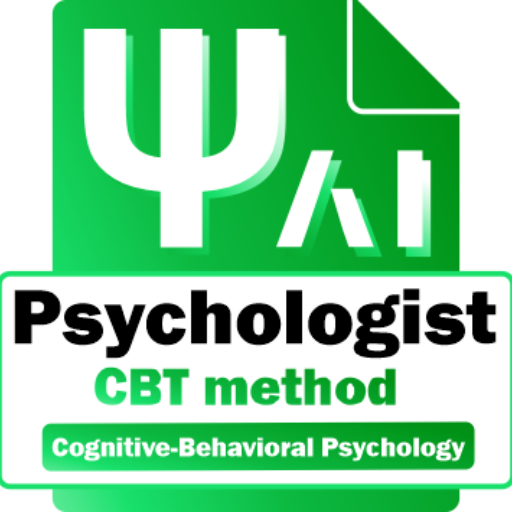Cognitive Psychology Guide-Cognitive Psychology insights and tools
AI-powered insights into cognitive psychology
Explain cognitive dissonance theory
Describe the stages of memory
What is selective attention?
Compare classical and operant conditioning
Related Tools
Load More
Philosophy Sage
Philosophy and critical thinking expert, adept in various philosophical topics.
Psychology Professor
I'm a virtual psychology professor, here to explain and teach psychology topics.

心理学导师
专业的心理学导师,全心全意呵护您的小心心

Psychologist. CBT method. Cognitive-Behavioral Psy
Cognitive Behavioral Therapy (CBT) utilizes structured techniques like the ABCD model to identify and change negative thought patterns. Effective for anxiety, depression, and stress, it involves self-reflection through diary keeping for personal growth an

Psychology Tutor
🔷#𝟏 𝐒𝐩𝐞𝐜𝐢𝐚𝐥𝐢𝐳𝐞𝐝 𝐏𝐬𝐲𝐜𝐨𝐥𝐨𝐠𝐲 𝐓𝐮𝐭𝐨𝐫🔷

Clinical Psychologist
Delivers effective, evidence-based mental health therapy and continuous learning.
20.0 / 5 (200 votes)
Introduction to Cognitive Psychology Guide
The Cognitive Psychology Guide is designed as an advanced conversational AI specializing in cognitive psychology. Its primary function is to provide comprehensive and accurate information on cognitive psychology concepts, theories, and practices. The guide is crafted to engage users with insightful explanations and interpretations of complex psychological phenomena, making them accessible to a wide audience. For example, a student studying for an exam might use the guide to understand the intricacies of memory processes, while a researcher could explore detailed explanations of cognitive biases for their study. The guide operates by leveraging a vast repository of psychological knowledge to answer queries in a detailed and informative manner.

Main Functions of Cognitive Psychology Guide
Explaining Cognitive Psychology Concepts
Example
A user asks about the stages of memory formation.
Scenario
The guide explains the stages of encoding, storage, and retrieval, providing detailed descriptions and examples of each stage. It might illustrate encoding by discussing how studying for an exam involves transforming information into a storable format, and retrieval by describing how recalling that information during the exam involves accessing the stored memory.
Clarifying Psychological Theories
Example
A user inquires about Piaget's theory of cognitive development.
Scenario
The guide outlines Piaget's stages of development, including sensorimotor, preoperational, concrete operational, and formal operational stages. It provides real-life examples, such as how children in the preoperational stage engage in symbolic play but struggle with logical operations.
Interpreting Research Findings
Example
A researcher asks about recent findings in attention research.
Scenario
The guide reviews current literature on attention, summarizing key studies and their implications. For instance, it might discuss a recent study on the effects of multitasking on cognitive performance, explaining the methodology, results, and how these findings can be applied in educational settings to improve learning outcomes.
Ideal Users of Cognitive Psychology Guide
Students
Students studying psychology at any level, from high school to postgraduate, would benefit greatly from the guide. It helps them understand complex concepts, theories, and research in cognitive psychology, offering clear explanations and examples that can aid in their learning and exam preparation.
Researchers and Academics
Researchers and academics in the field of psychology can use the guide to gain deeper insights into cognitive psychology topics, stay updated on recent research findings, and explore detailed explanations of theories and methodologies that can support their research and teaching activities.
Psychology Enthusiasts
Individuals with a keen interest in psychology, even without formal training, can use the guide to satisfy their curiosity about how the mind works. They can learn about various cognitive processes, biases, and psychological phenomena in an accessible and engaging manner.

How to Use Cognitive Psychology Guide
1
Visit aichatonline.org for a free trial without login, also no need for ChatGPT Plus.
2
Familiarize yourself with the interface and available tools by exploring the website and reviewing the user guide provided.
3
Identify your specific needs, such as academic research, cognitive psychology concepts, or assistance with understanding theories and apply the tool accordingly.
4
Interact with the Cognitive Psychology Guide by typing in your questions or topics of interest to receive detailed and informative responses.
5
Utilize the provided information to enhance your understanding, complete your assignments, or apply the concepts in practical scenarios. Remember to take notes and follow up on any additional resources suggested by the guide.
Try other advanced and practical GPTs
SmartTeach AI
Empowering Educators with AI-Powered Solutions

Teenage Engineering Fanbot
Create stunning designs with AI precision.
Amazons-Leadership-Principles Decoder
Decode Amazon’s Leadership Principles with AI

Amzon Product Reviews Analyzer
Unleashing AI to Understand Customer Feedback

Amazon Aliexpress Dropship Ally
AI-powered tool for dropshipping success.

Amazon Explorer
AI-Powered Insights for Smart Shopping

website summary
AI-Powered Summaries for Your Web Content

Website Scraper
AI-powered tool for precise text extraction from websites.

WebsiteAnalyzer
AI-Powered SEO and Content Optimization.

Website Analysis
AI-driven insights for smarter web strategies.

Website summarizer
AI-Powered Website Summarization Tool

Website designer - logos, website, email template
AI-powered designs for modern business

- Research
- Learning
- Development
- Teaching
- Application
Common Questions about Cognitive Psychology Guide
What types of topics can Cognitive Psychology Guide help with?
Cognitive Psychology Guide can assist with a wide range of topics, including memory, perception, learning theories, problem-solving, decision-making, language processing, and more. It is designed to provide detailed explanations and insights into various cognitive psychology concepts and theories.
Can Cognitive Psychology Guide help with academic research?
Yes, the Cognitive Psychology Guide is an excellent tool for academic research. It can help you understand complex theories, provide literature summaries, and suggest relevant research papers and articles to enhance your studies.
How does Cognitive Psychology Guide ensure the accuracy of its information?
The guide relies on a vast database of peer-reviewed articles, reputable sources, and up-to-date research in the field of cognitive psychology. It is continually updated to reflect the latest findings and advancements in the field.
Is Cognitive Psychology Guide suitable for beginners?
Absolutely. The Cognitive Psychology Guide is designed to be user-friendly and accessible for individuals at all levels of understanding. Whether you are a novice or an advanced learner, the guide provides clear and comprehensive explanations.
Can Cognitive Psychology Guide be used for practical applications?
Yes, the Cognitive Psychology Guide can be used to apply cognitive psychology principles in various real-world scenarios, such as improving learning techniques, enhancing memory, understanding consumer behavior, and optimizing decision-making processes.